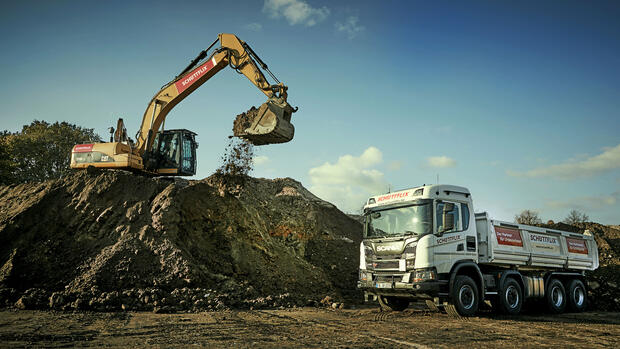Dusseldorf As soon as a construction company needs sand, crushed stone or gravel, they mainly obtain the materials from small and family-run companies. “When an entrepreneur is active throughout Germany, it is initially difficult to find out who the next reasonable supplier in the area is,” explains Christian Hülsewig, founder and CEO of the start-up Schüttflix.
This is how Schüttflix is also tackling a climate problem. When comparing suppliers, for example, the platform shows the option with the lowest CO2 emissions in the region. Because: Without knowing the nearest forwarding agents and companies in the area, there is a risk that the bulk goods will be transported over long distances.
Shorter transport routes not only help to save costs, but also CO2. In addition, the platform always offers a recycling alternative to natural building materials. “Conserving resources and being CO2-efficient, these are tough things to tackle in construction,” says Hülsewig.
By shortening the delivery routes, 1.5 million ton kilometers have been saved so far. According to the company, this corresponds to 100 tons of CO2 that could previously be avoided.
The start-up, which was founded in 2018 by Christian Hülsewig and Thomas Hagedorn, is successful with its strategy despite the construction crisis, inflation and increased raw material prices. Digital solutions are becoming increasingly popular in the construction industry. In 2022, Schüttflix was able to double its sales – to 90 million euros. “In a difficult market environment, we performed convincingly and are optimistic about the future,” said Hülsewig.
The Schüttflix founder says that finding digital solutions on the market is not easy.
(Photo: Schüttflix)
The goal is to continue to grow continuously. In the first quarter of 2023, a renewed increase in sales of 80 percent compared to the same period in the previous year was recorded. “This makes it clear how important digitization is for the resilience of the construction industry – especially in challenging times,” emphasizes the Schüttflix boss.
>> Read also: Digitization in construction – Nemetschek becomes Germany’s number two in software on the stock exchange
As an additional product, the platform offers a transport management system: the carriers and suppliers of the materials are marked with flags on a map. The next step is to invest further in the development of the digital platform.
Expansion to Eastern Europe: More than 24,000 Schüttflix users
Since mid-2022, the digital platform has not only been working in Germany, but also in Austria, Poland and the Czech Republic. More than 60 employees now work in the Eastern European markets.
Around 10,000 customers and partners who have access to more than 20,000 trucks are currently using the platform on the German market. With other European countries, there are a total of over 23,600 vehicles and more than 24,000 registered users.
>> Read also: 15 future jobs in the construction industry with high salaries and little competition
The industry was initially skeptical, according to Hülsewig. “It’s difficult to make it clear that the system is needed – because in principle everything can be done by phone call,” explains Hülsewig. But the simple handling of the platform ultimately convinced even more conservative building contractors.
Although the young company is posting higher sales and wants to continue to grow, Hülsewig feels held back by the bureaucracy and administrative processes in Germany. “We don’t have to talk about digitization potential, we have to implement it. Because as long as digitization is not spelled out in concrete terms in the public procurement manuals, public procurement will remain a paper monster,” explains the founder.
On this topic, Hülsewig would like to see uniform guidelines from politicians. The regulatory conditions for recycling materials are also complicated. However, he is hoping for impetus from the federal government’s raw materials strategy. In Germany, the start was comparatively more difficult than in Austria, Poland and the Czech Republic.
Strabag and Schüttflix: Construction company works with start-up
In addition, start-ups in the industry not only have to convince small and medium-sized companies, but also depend on cooperation with large corporations. Since 2020, Schüttflix has been working with Europe’s largest construction group: Strabag AG.
Especially when it comes to technological issues, the construction industry must “make a quantum leap,” said Strabag CEO Klemens Haselsteiner in an interview with the Handelsblatt. “How do we deal with the mountain of data that we generate?” It helps when start-ups, which can act differently than large corporations, challenge the industry with fresh ideas.
According to Haselsteiner, it should be in the interests of large companies to bring added value to the start-ups – not just being financial investors, but also helping to get the product to market. In this context, investments or cooperation in the areas of sensor technology, logistics or planning tools between start-ups and large construction groups are necessary.
It was worth it for Schüttflix. After the company was able to collect almost 14 million euros from the investors Speedinvest and HV Capital in 2020, Strabag has also been involved in the start-up since 2021. A new round of financing with the British venture capital fund Draper Esprit brought Schüttflix a further 45 million euros at the end of 2021.
More: Future market USA – Why construction companies are drawn to the United States during the crisis
